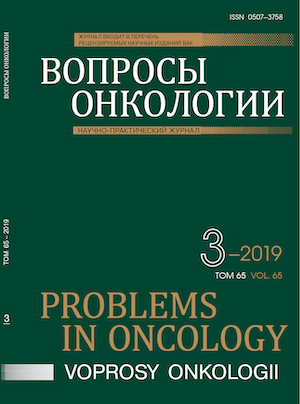Аннотация
Актуальность. В настоящее время при выборе тактики лечения особое положение стал занимать BRCA-ассоциированный рак молочной железы, хотя изначально лекарственное лечение таких пациентов немногим отличалось от терапии спорадического заболевания. Особый интерес сейчас представляет оценка дефицита гомологичной рекомбинации, который может включать в себя различные дисфункции гена BRCA1. При чем показано, что снижение функциональной активности BRCA1 имеет отражение в чувствительности опухоли к ДНК-повреждающим агентам, а прогноз заболевания становится более благоприятным.
Цель работы: оценка связи экспрессии гена BRCA1 в опухоли молочной железы с прогнозом заболевания.
Материалы и методы. В исследование включены 111 больных раком молочной железы T1-4N0-3M0 (IIA-IIIB стадии), с морфологически верифицированным диагнозом. оценена начальная и послеоперационная экспрессия BRCA1 в опухолевом материале. Из опухолевого материала до лечения и после НХТ выделяли РНК. Уровень экспрессии BRCA1 оценивали при помощи обратно-транскриптазной количественной ПЦР в режиме реального времени (RT-qPCR).
Результаты. В ходе проведенного исследования были оценены отдаленные результаты лечения пациентов в зависимости от уровня экспрессии гена BRCA1. Установлено, что наличие гипоэкспрессии BRCA1 (уровень менее 1) в опухолевой ткани после НХТ является благоприятным прогностическим фактором и сопряжен с высокими показателями безметастатической выживаемости выживаемости (p=0,0002). Кроме этого, аналогичный результат показан для пациентов, пролеченных по схеме НХТ FAC (p=0,005). Заслуживающий внимание результат продемонстрирован для 8 больных, у которых проводилась химиотерапия с включением препаратов платины. У всех пациентов наблюдались низкий послеоперационный уровень экспрессии BRCA1 и 100% безметастатическая и общая выживаемость.
Выводы. Таким образом, полученные данные свидетельствуют о прогностической значимости экспрессии гена BRCA1 в опухоли молочной железы после неоадъювантной химиотерапии.
Библиографические ссылки
Имянитов ЕН. Молекулярная диагностика в онкологии // Вопросы онкологии. - 2012. - 58. - C. 153-163.
Zhong Q., Peng H.L., Zhao X. et al. Effects of BRCA1-and BRCA2-related mutations on ovarian and breast cancer survival: a meta-analysis // Clinical Cancer Research. - 2015. - Vol. 21. - P. 211-220. - CCR-14-1816. DOI: 10.1158/1078-0432
Afghahi A., Timms K.M., Vinayak S. et al. Tumor BRCA1 reversion mutation arising during neoadjuvant platinum-based chemotherapy in triple-negative breast cancer is associated with therapy resistance // Clinical Cancer Research. - 2017. - Vol. 1. - P 1-26. - DOI: 10.1158/1078-0432.CCR-16-2174
Gerratana L., Fanotto V., Pelizzari G. et al. Do platinum salts fit all triple negative breast cancers? // Cancer treatment reviews. - 2016. - Vol. 48. - P. 34-41. - DOI: 10.1016/j.ctrv.2016.06.004
Mccabe N., Turner N.C., Lord C.J. et al. Deficiency in the repair of DNA damage by homologous recombination and sensitivity to poly (ADP-ribose) polymerase inhibition // Cancer research. - 2006. - Vol. 66. - P. 8109-8115. - DOI: 10.1158/0008-5472.CAN-06-0140
Schwartz G.F., Hortobagyi G.N. Proceedings of the consensus conference on neoadjuvant chemotherapy in carcinoma of the breast, April 26-28, 2003, Philadelphia, Pennsylvania // The Breast Journal. - 2004. - Vol. 10. - P. 273-294. - DOI: 10.111Vj.1075-122X.2004.21594.x.
Pfaffl M.W. A new mathematical model for relative quantification in real-time RT-PCR // Nucleic acids research. - 2001. - Vol. 29. - P 45. - DOI: 10.1093/nar/29.9.e45
Гафтон И.Г., Имянитов Е.Н., Семиглазов В.В. и др. Экспрессия гена BRCA1 при нейроэндокринных опухолях желудочно-кишечного тракта // Сибирский онкологический журнал. - 2014. - Т. 16. - С. 11-15.
Imyanitov E.N., Moiseyenko V.M. Drug therapy for hereditary cancers // Hereditary cancer in clinical practice. - 2011. - Vol. 9. - P 1-16. - DOI: 10.1186/1897-4287-9-5
Kurebayashi J., Yamamoto Y, Kurosumi M. et al. Loss of BRCA1 expression may predict shorter time-to-progression in metastatic breast cancer patients treated with taxanes // Anticancer research. - 2006. - Vol. 26. - P. 695-701.
Tsibulak I., Shivalingaiah G., Wenzel S. et al. Clinical impact of BRCA1 and BRCA2 mRNA expression in ovarian cancer // American Society of Clinical Oncology. - 2018. - Vol. 36. - e17533. - suppl.e17533. DOI: 10.1200/jm.2018.36.15_
Nomura H., Kataoka F., Aoki D. et al. Expression of potential biomarkers associated with homologous recombination repair in patients with ovarian or triplenegative breast cancer // Cancer Biomarkers. - 2016. - Vol. 16. - P 145-152. - DOI: 10.3233/CBM-150550

Это произведение доступно по лицензии Creative Commons «Attribution-NonCommercial-NoDerivatives» («Атрибуция — Некоммерческое использование — Без производных произведений») 4.0 Всемирная.
© АННМО «Вопросы онкологии», Copyright (c) 2019
